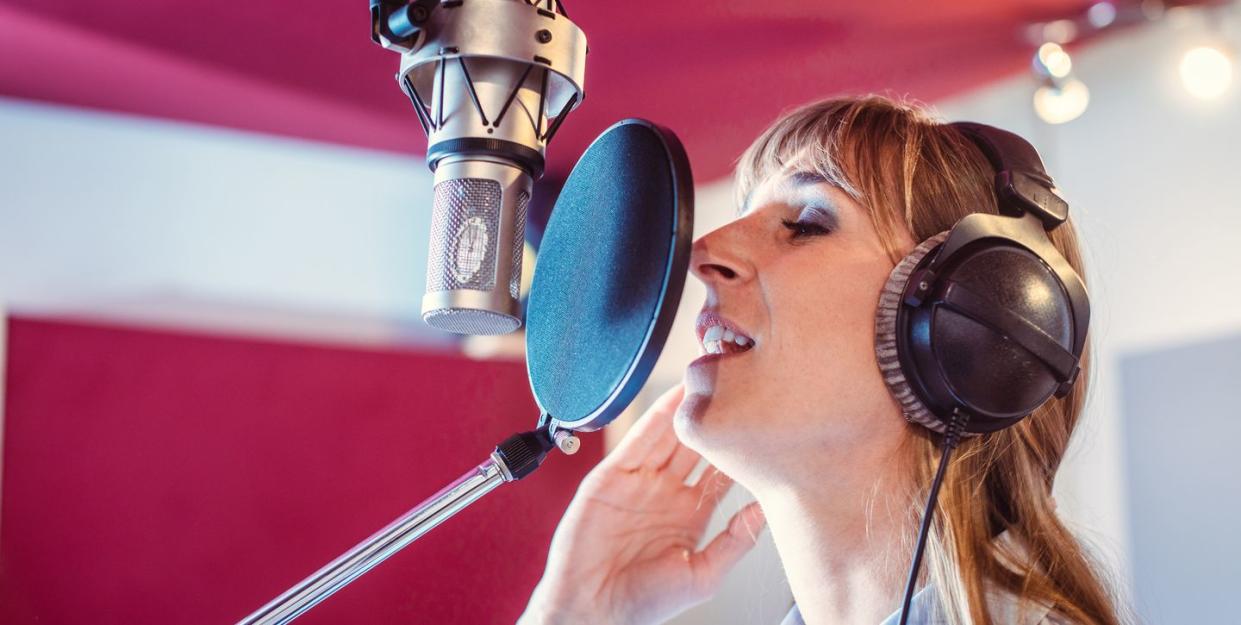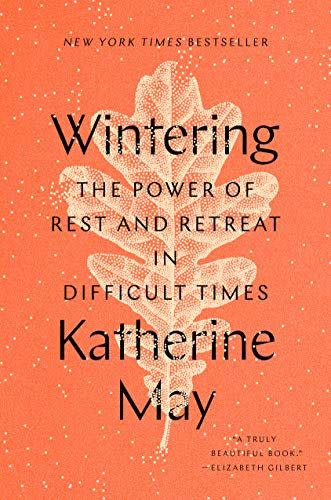A New Mother’s Voice Abandons Her

"Hearst Magazines and Yahoo may earn commission or revenue on some items through these links."
A year after I had my son, I lost my voice. I don’t mean that I lost it altogether. Instead, it became weak and thin, trembling at the edges. If I spoke for any length of time, it would begin to crackle, and then cut in and out like a faulty microphone. My throat tickled. I would cough ineffectually. Eventually, my throat would whistle into silence, while I swallowed, and drank water, and fretfully tried to rest it back into life again.
I had navigated my entire life by talking, and suddenly my voice was unreliable. My speech was being chopped up, my words randomly erased. In everyday conversation with people I knew, I would talk until it faded, and then wave my hand, hoping they could extrapolate the rest of what I meant to say. In the outside world, it was more difficult. I found myself blaming colds and sore throats that I didn’t have, without really knowing why I was lying. I suppose it was preferable to be seen as temporarily useless, rather than feeling permanently so. Often, in large groups of people I didn’t know, I wouldn’t speak at all.
One of the greatest blows was that I could no longer sing. It’s tempting to glibly write, “Not that singing played a huge part in my life…” but that wouldn’t be true. It may not be my profession, or my ambition, but singing has sustained me for as long as I can remember, from attempting harmonies in the car with my mother to warbling along to the radio while I cook. I sung in choirs at school and at university, my low alto knitting with the other voices. Singing with others is a kind of alchemy, an act of expansive magic in which you lose yourself and become part of a whole. I have long been reliant on the stress release of booming out half-remembered choir parts when I’m driving alone in my car.
The usual diagnoses did not apply. I had a camera inserted into my nose and pushed down my throat, and it found nothing: no polyps, no inflammation. Nothing that could be treated or cured. I had lost my voice; that was all. It was just something that had happened, alongside all the other things that obliterated my sense of being a relevant presence in the world.
When a friend suggested singing lessons, I laughed and said that really wasn’t the most important thing. I had no intention of ever airing my voice in public again. But she said, no, it wasn’t about singing. She thought that a good teacher could help me to nurture my voice back into health, and look after it in the future. Apparently, it happens all the time in the performing arts: Voices become frail and need restoring or remapping. My voice was an asset, and I should treat it in the way that other professionals did. Giving up was not an option.
I sent a tentative email to a teacher, explaining that I didn’t really want to learn to sing per se, but instead to learn to talk again. I was surprised that he even replied, but he seemed to find my request entirely reasonable, although he did point out that I would have to sing. I thought that I could manage that. We agreed on a time and date.
In the run-up, I wondered whether I actually could manage it. Newly unable to hit a single clean note and hold it, I was embarrassed to air my singing voice in public, and particularly in a room in which decent singers came to polish their style. But Philip, my tutor, struck me as a practical man. He said we should start with some basics, like standing and breathing. I cracked the joke (which I’m sure he’d heard a million times before) that I hopefully knew how to stand and breathe by now, but at that point, I wasn’t so sure if that were true. Standing and breathing felt far too much like the behavior of a steady, competent adult, one who had a place in the world.
So I learned to make myself stable, and to take air into my lungs. And then we tried to sing some scales. Philip played a middle C, and my voice glanced off it.
“See?” I said. It was a lost cause.
“Try B,” said Philip.
I could sing B. The note was full of air, but I could hit it, and the A below it. I worked my way down through the scale, and back up it again, and found that I could hit that C when it came after a burst of other notes. From then on, my scales started with an A, or even a few notes below. Sometimes, you need to take a few steps back and start somewhere else.
Over the weeks that followed, we worked on getting the clarity back in my singing voice, the volume and precision of which I’d once been so proud. I learned to engage the muscles at the base of my throat, and to imagine pulling an invisible thread forward as I sung to keep my voice originating from my lower larynx. I learned to flow one note into another, to keep my song running like water. After my sessions, I didn’t have the sore throat that I expected. I felt like a small part of my body had relaxed, and that I had expanded ever so slightly. I had sucked in the air around me, and stopped being concave, pressed inward by life.
After a couple of lessons, we fell into conversation about how I really use my voice. “Do you ever read your work aloud?” asked Philip.
“Sometimes,” I said. “Not as much as I used to.” The layers of truth hidden below that: that nobody asked me anymore; that I no longer really enjoyed the attention, nor had the faith in my work. But that I nevertheless spent all day performing at work, dancing with other people’s writing instead of my own, trying—sometimes in vain—to energize rooms of students who were already weighed down with their own thoughts and troubles.
“Do you know Under Milk Wood?” asked Philip, and I said that, by coincidence, I had a brand new copy sitting on my desk back at work, ready to support somebody’s dissertation. Philip opened his copy and rested it on the music stand. “Read the first page,” he said, and all over again my voice faltered. It is spring, moonless night in the small town, starless and bible-black, the cobble streets silent... I couldn’t marshal my breath for those long, meandering sentences. In silence, I could understand them well enough, but aloud, I stammered over them like a child learning to read.
After I’d mangled And all the people of the lulled and dumfound town are sleeping now, Philip stopped me. “Listen,” he said, and he read it himself, bouncing softly onto each stressed syllable, letting the words wash onto each other like waves on the sea. “You have to approach it like a song,” he said. “Take your time. Don’t attack it. Roll along with it.”
I tried again, shy this time, now that I’d seen my own flaws so clearly. I thought I knew how to read aloud and read well. But I hadn’t read this gentle, flowing text so much as dismantled it. I had gone at it like a thing to be conquered, and instead it had conquered me. It was shining a light on everything that was wrong in my life at that moment in time. I saw how I was locked in an attack on my immediate environment, rather than merging into it.
“Long Welsh vowels,” said Philip, and that made things a little better. It was hard to elongate my own, clipped Kentish phrasing without pastiching the accent, but we practiced individual words and the unhurried tone gradually fell into place: hymning in bonnet and brooch and bombazine black, that final k clicking like a wet log on a warm fire.
Listen. It is night moving in the streets… Listen. It is night in the chill, squat chapel. When you start to use your voice as music, you are allowed to demand attention. You are allowed to say, “Listen.” My voice had waned alongside my confidence, and asserting it again was like asserting my rightful part in the adult world.
Within four lessons, I had remapped my voice, bringing it lower and louder and softer and slower. I had learned to almost sing my words, to let them elide into each other as a continuous river of notes, like birdsong. My middle C reappeared, but that didn’t seem like the most important gain. When I spoke now, my voice felt smooth and slick, as though it had been oiled. It no longer tickled; it no longer broke. The words flowed back out of me like silk.

Wintering: The Power of Rest and Retreat in Difficult Times
amazon.com
amazon.comBut I was glad to sing again, too. It had been a greater loss than I’d realized, in that particular wintering which saw the waning of my voice. The right to sing is an absolute, regardless of how it sounds to the outside world. We sing because we must. We sing because it fills our lungs with nourishing air and lets our hearts soar with the notes we let out. We sing because it allows us to speak of love and loss, delight and desire, all encoded in lyrics that let us pretend that those feelings are not quite ours. In song, we have permission to rehearse all our heartbreaks, all our lusts. In song, we can console our children while they are still too young to judge our rusty voices, and we can find shortcuts to ecstasy while performing the mundane duty of a daily shower, or scrubbing down the kitchen after yet another meal.
Best of all, we can sing together, whole families knowing the same songs and giving them the same meaning. When I sing with my mother, I am struck every time that our voices are the same. There’s a moment of deep, genetic resonance in hitting the exact same note, in the exact same way. When I sing with my husband, our voices clash, but we sing the songs that mean something only to us, most often the yearning tones of the “Wichita Lineman.” When I sing with my son, I am teaching him something: not just words and lyrics, but how to survive. Like the robin, we sometimes sing to show how strong we are, and we sometimes sing in hope of better times. We sing either way.
Excerpted from Wintering: The Power of Rest and Retreat in Difficult Times (Riverhead Books), by Katherine May. Her new book, Enchanted, will be published on February 28, 2023, and is available to preorder.
You Might Also Like

